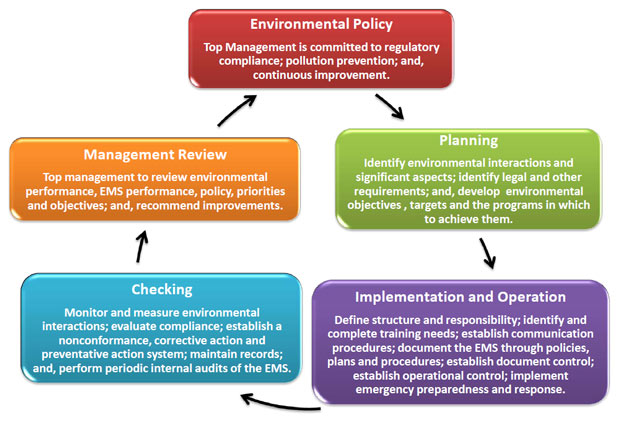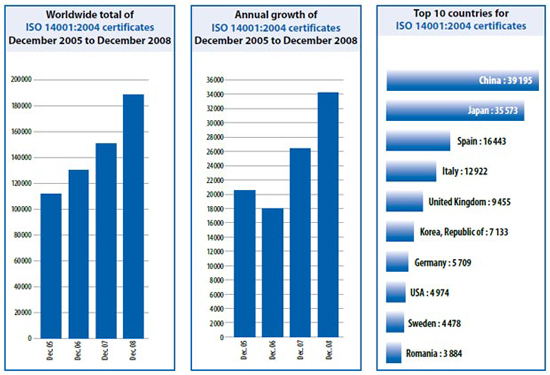What is an environmental management system?
An ISO 14001 environmental
management system (or commonly referred to as an EMS) is a structured
system designed to help organisations manage their environmental impacts
and improve environmental performance caused by their products,
services and activities. An environmental management system provides
structure to environmental management and covers areas such as
training, record management, inspections, objectives and policies.
Implementation of an environmental management system requires the following steps to be completed by an organisation: Development of an environmental policy that reflects its commitments;
Development of an environmental policy that reflects its commitments; Appointment of a person(s) responsible for its coordination;
Appointment of a person(s) responsible for its coordination; Identification of how the organisation interacts with the environment;
Identification of how the organisation interacts with the environment; Identification of actual and potential environmental impacts;
Identification of actual and potential environmental impacts; Identification of relevant legal and other requirements;
Identification of relevant legal and other requirements; Establishment of environmental objectives, targets and programs;
Establishment of environmental objectives, targets and programs; Monitoring and measurement of the progress to achieve its objectives;
Monitoring and measurement of the progress to achieve its objectives; Reviewing the system and environmental performance; and
Reviewing the system and environmental performance; and Continuous improvement of the organisation's environmental performance.
Continuous improvement of the organisation's environmental performance.By design the system and environmental performance run in a continuous improvement cycle outlined in the diagram below.

Currently in Australia there are over 2,000 organisations certified to the ISO 14001 environmental management system standard. Up to the end of December 2008 there were over 188,000 organisations globally certified. A total of 155 countries had organisations participating in the scheme. The diagram below illustrates the ISO 2008 survey results for the standard. It should be noted there are many more organisations with environmental management systems not certified to the ISO 14001 standard.


What is ISO 14000 and ISO 14004?
ISO 14001 environmental management system standard should be used in conjunction with ISO 14004 Environmental managements systems – General guidelines on principles, systems and support techniques. ISO 14004 provides guidelines for the elements of an environmental management system and its implementation.

What is the Eco-Management and Audit Scheme?
 The Eco-Management and Audit Scheme (EMAS) is an
organisational management tool for the evaluation, reporting and
continuous improvement of environmental performance. The scheme has
been successfully integrated into many business types in the EU where it
is defined in legislation and the uptake is on a voluntary level.
The Eco-Management and Audit Scheme (EMAS) is an
organisational management tool for the evaluation, reporting and
continuous improvement of environmental performance. The scheme has
been successfully integrated into many business types in the EU where it
is defined in legislation and the uptake is on a voluntary level. EMAS is an environmental management scheme, whereby EU organisations develop an environmental management system (to ISO 14001 environmental management system standard or in line with the environmental management system specified in EMAS) and have their system externally verified. Organisations are then able to become registered.
The scheme is yet to be recognised throughout Australia, however, tools for developing simplified environmental management systems are available at the Eco-mapping website. Additionally, there is some interest in Eco-mapping by some Environmental Protection Authorities and some organisations wanting to improve their environmental performance without all of the commitment and resources typically allocated to more traditional ISO 14001 environmental management systems.

In-house or outsourced development?
If the answer is to outsource its development the experience and qualifications of the Environmental Consultant should be assessed. Engaging a consultant that specialises in environmental risk management and environmental management system development as well as having adequate qualifications and experience could be considered.

I recently came across your blog and have been reading along. I thought I would leave my first comment.
ReplyDeleteISO 14001 Certification
I am definitely enjoying your website. You definitely have some great insight and great stories. Tourism
ReplyDeleteThe power of ISO Environmental Management System (ISO 14001) and ISO Health and Safety Management System (ISO 45001) comes into play
ReplyDeleteAn ISO Environmental Management System (EMS), most commonly based on the ISO 14001 standard, is a voluntary framework that organizations implement to systematically manage their environmental aspects, reduce negative impacts, and ensure legal compliance. It provides a structured approach for setting environmental objectives, establishing processes to achieve them, measuring performance, and continually improving. By integrating environmental management into core business operations, an ISO EMS helps companies enhance their sustainability profile, improve resource efficiency, reduce waste, gain stakeholder trust, and ultimately contribute to both environmental protection and long-term business success.
ReplyDelete